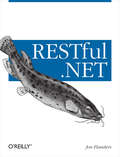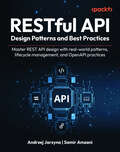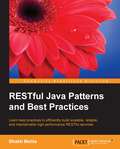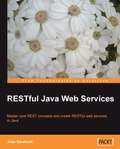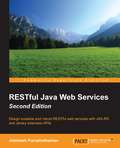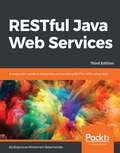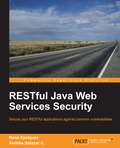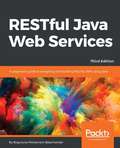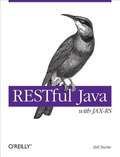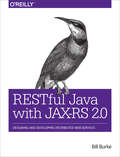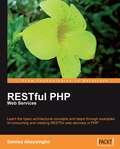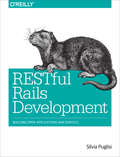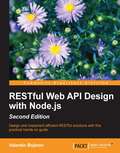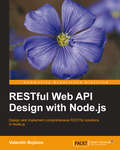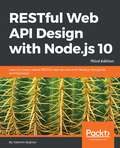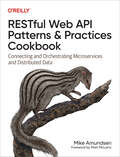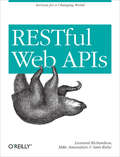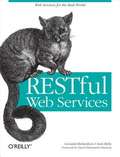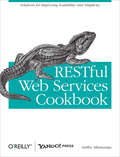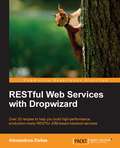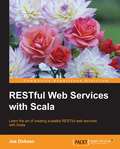- Table View
- List View
RESTful .NET: Build and Consume RESTful Web Services with .NET 3.5
by Jon FlandersRESTful .NET is the first book that teaches Windows developers to build RESTful web services using the latest Microsoft tools. Written by Windows Communication Foundation (WFC) expert Jon Flanders, this hands-on tutorial demonstrates how you can use WCF and other components of the .NET 3.5 Framework to build, deploy and use REST-based web services in a variety of application scenarios.RESTful architecture offers a simpler approach to building web services than SOAP, SOA, and the cumbersome WS- stack. And WCF has proven to be a flexible technology for building distributed systems not necessarily tied to WS- standards. RESTful .NET provides you with a complete guide to the WCF REST programming model for building web services consumed either by machines or humans. You'll learn how to:Program Read-Only (GET) servicesProgram READ/WRITE servicesHost REST servicesProgram REST feedsProgram AJAX REST clientsSecure REST endpointsUse workflow to deliver REST servicesConsume RESTful XML services using WCFWork with HTTPWork with ADO.NET Data Services (Astoria)RESTful .NET introduces you to the ideas of REST and RESTful architecture, and includes a detailed discussion of how the Web/REST model plugs into the WCF architecture. If you develop with .NET, it's time to jump on the RESTful bandwagon. This book explains how."While REST is simple, WCF is not. To really understand and exploit this part of WCF requires a knowledgeable and experienced guide. I don't know anybody who's better suited for this role than Jon Flanders. ...Jon is first-rate at explaining complicated things. This book is the best introduction I've seen to creating and using these services with WCF."--David Chappell, Chappell & Associates
RESTful API Design Patterns and Best Practices: Master REST API design with real-world patterns, lifecycle management, and OpenAPI practices
by Andrzej Jarzyna Samir AmzaniLearn how to build robust, future-proof APIs by applying the latest industry best practices, avoiding common pitfalls, and understanding anti-patternsKey FeaturesDesign APIs with your audience in mind to improve usability, lifecycle management, and communicationLearn how to create a client-centric REST API design leveraging OpenAPI and JSON SchemaExplore API versioning strategies, and gain hands-on experience with API testing and implementationPurchase of the print or Kindle book includes a free PDF eBookBook DescriptionDesigning scalable, user-focused, and robust APIs that are built to last isn’t just a technical challenge but a design imperative. Written by API leaders with over 30 years of combined experience advancing API strategy, governance, and community, this book is your comprehensive guide to API design, focusing on domain-driven, consumer-centric APIs that meet real-world user needs while remaining flexible and maintainable over time. It covers modern REST API design, the use of tools like OpenAPI and JSON Schema, and the importance of a product-based approach. The chapters help you explore best practices, potential pitfalls, and anti-patterns, extending beyond the design phase. Starting with the “why” behind building an API, its intended users, and value, this book walks you through the API lifecycle, the role of contracts, and the application of domain-driven design. You’ll develop a solid foundation in REST API design as you discover different styles, design constraints, and more. Beyond design, the book covers testing techniques, API evolution, maintenance, and deprecation. By the end of the book, you’ll not only know how to design great APIs but will understand how to treat them as products, manage their full lifecycle, and deliver real value by ensuring your APIs stay relevant and reliable long after their initial release.What you will learnAssess your client's needs to design APIs that communicate the value of your productUnderstand the role of API lifecycle and the importance of contractsApply domain-driven design principles in API architectureEmbrace a modern approach to REST API designUse the OpenAPI Specification and JSON Schema for standardized APIsEvolve, maintain, and deprecate your APIs without disrupting your usersWho this book is forThis book is for professionals involved in the digital product lifecycle who want to deepen their understanding of API design and build future-proof APIs with a product-centric approach. API developers, solution architects and engineers, technical product owners, and software architects looking to extend their skills in creating efficient, scalable, and maintainable APIs will find this book particularly useful. Basic knowledge of APIs and the HTTP protocol is recommended to fully benefit from the design principles and practices covered.
RESTful Java Patterns and Best Practices
by Bhakti MehtaThis book is aimed at novice developers who want to gain insights into building RESTful services and improve productivity, as well as for advanced developers who want to delve into more complicated topics.
RESTful Java Web Services
by Jose SandovalThe approach we take is ideal for software developers with some, or extensive, programming experience: we design a RESTful API, which serves as our software specification, and implement it with every framework discussed in the book--there are no hypothetical examples; only practical working applications. This book is for Java developers who want to code RESTful web services using any of the open source RESTful frameworks available to date, for example, JAX-RS implementations such as Jersey and RESTEasy, the Restlet lightweight framework, or Struts 2 with the REST plug-in. You don't need to know REST, as we cover the theory of REST and web services; however, you should be familiar with the Java language and have some understanding of Java web applications. For each framework, we develop the same web service outlined in Chapter 4, so there is lots of working code available. This is a practical guide and the majority of the book is about coding RESTful web services, and not just about the theory of REST.
RESTful Java Web Services - Second Edition
by Jobinesh PurushothamanDesign scalable and robust RESTful web services with JAX-RS and Jersey extension APIs About This Book * Get to grips with the portable Java APIs used for JSON processing * Design solutions to produce, consume, and visualize RESTful web services using WADL, RAML, and Swagger * A step-by-step guide packed with many real-life use-cases to help you build efficient and secure RESTful web APIs in Java Who This Book Is For If you are a web developer with a basic understanding of the REST concepts but are new to the idea of designing and developing RESTful web services, this is the book for you. As all the code samples for the book are written in Java, proficiency in Java is a must. What You Will Learn * Introduce yourself to the RESTful software architectural style and the REST API design principles * Make use of the JSR 353 APIs and Jackson API for JSON processing * Build portable RESTful web APIs, making use of the JAX-RS 2.0 API * Simplify API development using the Jersey extension APIs * Secure your RESTful web services with various authentication and authorization mechanisms * Get to grips with the various metadata solutions to describe, produce, and consume RESTful web services * Understand the design and coding guidelines to build well-performing RESTful APIs * See how the role of RESTful web services changes with emerging technologies and trends In Detail REST (REpresentational State Transfer) is a simple yet powerful software architecture style to create scalable web services and allow them to be simple, lightweight, and fast. The REST API uses HTTP and JSON, so that it can be used with many programming languages such as Ruby, Java, Python, and Scala. Its use in Java seems to be the most popular though, because of the API's reusability. This book is a guide to developing RESTful web services in Java using the popular RESTful framework APIs available today. You will begin with gaining an in-depth knowledge of the RESTful software architectural style and its relevance in modern applications. Further, you will understand the APIs to parse, generate, transform, and query JSON effectively. Then, you will see how to build a simple RESTful service using the popular JAX-RS 2.0 API along with some real-world examples. This book will introduce you to the Jersey framework API, which is used to simplify your web services. You will also see how to secure your services with various authentication mechanisms. You will get to grips with various solutions to describe, produce, consume, and visualize RESTful web services. Finally, you will see how to design your web services to equip them for the future technological advances, be it Cloud or mobile computing. By the end of this book, you will be able to efficiently build robust, scalable, and secure RESTful web services, making use of the JAX-RS and Jersey framework extensions. Style and approach This book is written as a step-by-step guide to designing and developing robust RESTful web services. Each topic is explained in a simple and easy-to-understand manner with lots of real-life use-cases and their solutions.
RESTful Java Web Services - Third Edition
by Bogunuva Mohanram BalachandarMaster core REST concepts and create RESTful web services in Java About This Book • Build efficient and secure RESTful web APIs in Java.. • Design solutions to produce, consume and visualize RESTful web services using WADL, RAML, and Swagger • Familiarize the role of RESTful APIs usage in emerging technology trends like Cloud, IoT, Social Media. Who This Book Is For If you are a web developer with a basic understanding of the REST concepts and envisage to get acquainted with the idea of designing and developing RESTful web services, this is the book for you. As all the code samples for the book are written in Java, proficiency in Java is a must. What You Will Learn • Introduce yourself to the RESTful software architectural style and the REST API design principles • Make use of the JSR 353 API, JSR 374 API, JSR 367 API and Jackson API for JSON processing • Build portable RESTful web APIs, making use of the JAX-RS 2.1 API • Simplify API development using the Jersey and RESTEasy extension APIs • Secure your RESTful web services with various authentication and authorization mechanisms • Get to grips with the various metadata solutions to describe, produce, and consume RESTful web services • Understand the design and coding guidelines to build well-performing RESTful APIs • See how the role of RESTful web services changes with emerging technologies and trends In Detail Representational State Transfer (REST) is a simple yet powerful software architecture style to create lightweight and scalable web services. The RESTful web services use HTTP as the transport protocol and can use any message formats, including XML, JSON(widely used), CSV, and many more, which makes it easily inter-operable across different languages and platforms. This successful book is currently in its 3rd edition and has been used by thousands of developers. It serves as an excellent guide for developing RESTful web services in Java. This book attempts to familiarize the reader with the concepts of REST. It is a pragmatic guide for designing and developing web services using Java APIs for real-life use cases following best practices and for learning to secure REST APIs using OAuth and JWT. Finally, you will learn the role of RESTful web services for future technological advances, be it cloud, IoT or social media. By the end of this book, you will be able to efficiently build robust, scalable, and secure RESTful web services using Java APIs. Style and approach Step-by-step guide to designing and developing robust RESTful web services. Each topic is explained in a simple and easy-to-understand manner with lots of real-life use-cases and their solutions.
RESTful Java Web Services Security
by Rene Enriquez Andres Salazar C.A sequential and easy-to-follow guide which allows you to understand the concepts related to securing web apps/services quickly and efficiently, since each topic is explained and described with the help of an example and in a step-by-step manner, helping you to easily implement the examples in your own projects. This book is intended for web application developers who use RESTful web services to power their websites. Prior knowledge of RESTful is not mandatory, but would be advisable.
RESTful Java Web Services, Third Edition
by Bogunuva Mohanram BalachandarMaster core REST concepts and create RESTful web services in Java About This Book Build efficient and secure RESTful web APIs in Java.. Design solutions to produce, consume and visualize RESTful web services using WADL, RAML, and Swagger Familiarize the role of RESTful APIs usage in emerging technology trends like Cloud, IoT, Social Media. Who This Book Is For If you are a web developer with a basic understanding of the REST concepts and envisage to get acquainted with the idea of designing and developing RESTful web services, this is the book for you. As all the code samples for the book are written in Java, proficiency in Java is a must. What You Will Learn Introduce yourself to the RESTful software architectural style and the REST API design principles Make use of the JSR 353 API, JSR 374 API, JSR 367 API and Jackson API for JSON processing Build portable RESTful web APIs, making use of the JAX-RS 2.1 API Simplify API development using the Jersey and RESTEasy extension APIs Secure your RESTful web services with various authentication and authorization mechanisms Get to grips with the various metadata solutions to describe, produce, and consume RESTful web services Understand the design and coding guidelines to build well-performing RESTful APIs See how the role of RESTful web services changes with emerging technologies and trends In Detail Representational State Transfer (REST) is a simple yet powerful software architecture style to create lightweight and scalable web services. The RESTful web services use HTTP as the transport protocol and can use any message formats, including XML, JSON(widely used), CSV, and many more, which makes it easily inter-operable across different languages and platforms. This successful book is currently in its 3rd edition and has been used by thousands of developers. It serves as an excellent guide for developing RESTful web services in Java. This book attempts to familiarize the reader with the concepts of REST. It is a pragmatic guide for designing and developing web services using Java APIs for real-life use cases following best practices and for learning to secure REST APIs using OAuth and JWT. Finally, you will learn the role of RESTful web services for future technological advances, be it cloud, IoT or social media. By the end of this book, you will be able to efficiently build robust, scalable, and secure RESTful web services using Java APIs. Style and approach Step-by-step guide to designing and developing robust RESTful web services. Each topic is explained in a simple and easy-to-understand manner with lots of real-life use-cases and their solutions.
RESTful Java with JAX-RS
by Bill BurkeLearn how to design and develop distributed web services in Java using RESTful architectural principals and the JAX-RS specification in Java EE 6. With this hands-on reference, you'll focus on implementation rather than theory, and discover why the RESTful method is far better than technologies like CORBA and SOAP. It's easy to get started with services based on the REST architecture. RESTful Java with JAX-RS includes a technical guide that explains REST and JAX-RS, how they work, and when to use them. With the RESTEasy workbook that follows, you get step-by-step instructions for installing, configuring, and running several working JAX-RS examples using the JBoss RESTEasy implementation of JAX-RS. Work on the design of a distributed RESTful interface, and develop it in Java as a JAX-RS service Dispatch HTTP requests in JAX-RS, and learn how to extract information from them Deploy your web services within Java Enterprise Edition using the Application class, Default Component Model, EJB Integration, Spring Integration, and JPA Discover several options for securing your web services Learn how to implement RESTful design patterns using JAX-RS Write RESTful clients in Java using libraries and frameworks such as java.net.URL, Apache HTTP Client, and RESTEasy Proxy
RESTful Java with JAX-RS 2.0: Designing and Developing Distributed Web Services
by Bill BurkeLearn how to design and develop distributed web services in Java, using RESTful architectural principles and the JAX-RS 2.0 specification in Java EE 7. By focusing on implementation rather than theory, this hands-on reference demonstrates how easy it is to get started with services based on the REST architecture.With the book’s technical guide, you’ll learn how REST and JAX-RS work and when to use them. The RESTEasy workbook that follows provides step-by-step instructions for installing, configuring, and running several working JAX-RS examples, using the JBoss RESTEasy implementation of JAX-RS 2.0.Learn JAX-RS 2.0 features, including a client API, server-side asynchronous HTTP, and filters and interceptorsExamine the design of a distributed RESTful interface for an e-commerce order entry systemUse the JAX-RS Response object to return complex responses to your client (ResponseBuilder)Increase the performance of your services by leveraging HTTP caching protocolsDeploy and integrate web services within Java EE7, servlet containers, EJB, Spring, and JPALearn popular mechanisms to perform authentication on the Web, including client-side SSL and OAuth 2.0
RESTful PHP Web Services
by Samisa AbeysingheThe book explains the basic concepts associated with the REST architectural style, but the emphasis is on creating PHP code for consuming and creating RESTful services in PHP. There is plenty of example PHP code to illustrate the concepts, with careful explanations of how the code works. This book targets PHP developers who want to build or make use of RESTful web services, or explore the options available to them in PHP. You will need to know the basics of PHP development, but no knowledge of REST is assumed, nor any knowledge of creating web services generally.
RESTful Rails Development
by Silvia PuglisiThis book serves as a practical guide to developing RESTful applications, designing RESTful architectures, and deploying RESTful services using Ruby on Rails. By the end of each chapter, the reader will have key takeaways for how to build and extend a multi-service platform spanning different devices. The book explains the power of RESTful development with Rails, illustrating how to build an architecture composed of different services accessing shared resources through a set of collaborating APIs and applications.
RESTful Rails Development: Building Open Applications and Services
by Silvia PuglisiThe Web is slowly but surely changing from a model in which a human reader browses content on web pages to a model in which services and clients (not necessarily humans) exchange information. And because of this, author Silvia Puglisi explains, it makes more sense to build platforms instead of just products or applications. Platforms are like ecosystems interconnecting different applications, services, users, developers, and partners, and offer many benefits.In this book, you'll learn how to design and develop Representational State Transfer (REST) platforms in Rails. You'll begin with an introduction to Ruby on Rails, and then move quickly through new concepts. At the end of each chapter, you'll have learned something new about building and organically extending a multi-service platform spanning different devices—and will have had some fun in the process. By the end of the book you'll know how to build an architecture composed of different services accessing shared resources through a set of collaborating APIs and applications.Explore the basics of REST and HTTP, including REST architecture and the role of hypermediaGet to know Rails and Ruby on RailsLearn about API development and create an APITake a thorough look at REST, including Asynchronous REST and testing RESTful servicesWork with data streams as you map them onto an application UI and integrate external APIs in your applicationLearn about device-independent developmentUse data analytics to recognize important events, develop key metrics, and track themExplore various tools you can use to build your own data analytic platformLearn how to scale a Rails application successfullyExamine privacy and security issues and the implications of handling and collecting user data
RESTful Web API Design with Node.JS - Second Edition
by Valentin BojinovThe ideal target audience for this book is web developers who have some experience with RESTful services. Familiarity with basic JavaScript programming techniques is required. No prior experience with Node.JS or Express is required.
RESTful Web API Design with Node.js
by Valentin BojinovIf you are a web developer wanting to enrich your development skills to create scalable, server-side, RESTful applications based on the Node.js platform, this book is for you. You also need to be aware of HTTP communication concepts and should have a working knowledge of JavaScript. Knowledge of REST would be an added advantage but is definitely not a necessity.
RESTful Web API Design with Node.js 10 - Third Edition.: Learn To Create Robust Restful Web Services With Node.js, Mongodb, And Express.js
by Valentin BojinovRESTful services have become the standard data feed providers for social services, news feeds, and mobiles. If you want to build fast REST APIs and want to deliver a large amount of data to millions of users, you'll find this book extremely useful. This book will teach you to create scalable RESTful applications based on the Node.js platform.
RESTful Web API Design with Node.js 10, Third Edition: Learn to create robust RESTful web services with Node.js, MongoDB, and Express.js, 3rd Edition
by Valentin BojinovDesign and implement scalable and maintainable RESTful solutions with Node.js 10Key FeaturesCreate rich and scalable RESTful API solutions from scratchExplore the new features of Node.js 10, Express 4.0, and MongoDBIntegrate MongoDB in your Node.js application to store and secure your dataBook DescriptionWhen building RESTful services, it is really important to choose the right framework. Node.js, with its asynchronous, event-driven architecture, is exactly the right choice for building RESTful APIs.This third edition of RESTful Web API Design with Node.js 10 will teach you to create scalable and rich RESTful applications based on the Node.js platform. You will be introduced to the latest NPM package handler and understand how to use it to customize your RESTful development process. You will begin by understanding the key principle that makes an HTTP application a RESTful-enabled application. After writing a simple HTTP request handler, you will create and test Node.js modules using automated tests and mock objects; explore using the NoSQL database, MongoDB, to store data; and get to grips with using self-descriptive URLs. You’ll learn to set accurate HTTP status codes along with understanding how to keep your applications backward-compatible. Also, while implementing a full-fledged RESTful service, you will use Swagger to document the API and implement automation tests for a REST-enabled endpoint with Mocha. Lastly, you will explore some authentication techniques to secure your application. What you will learn Install, develop, and test your own Node.js user modulesUnderstand the differences between HTTP and RESTful applicationsUse self-descriptive URLs and set accurate HTTP status codesEliminate third-party dependencies in your tests with mockingImplement automation tests for a REST-enabled endpoint with MochaSecure your services with NoSQL database integration within Node.js applications Integrate a simple frontend using JavaScript libraries available on a CDN serverWho this book is forIf you are a web developer keen to enrich your development skills to create server-side RESTful applications based on the Node.js platform, this book is for you. Some knowledge of REST would be an added advantage, but is definitely not a necessity.
RESTful Web API Patterns and Practices Cookbook: Connecting and Orchestrating Microservices and Distributed Data
by Mike AmundsenMany organizations today orchestrate and maintain apps that rely on other people's services. Software designers, developers, and architects in those companies often work to coordinate and maintain apps based on existing microservices, including third-party services that run outside their ecosystem. This cookbook provides proven recipes to help you get those many disparate parts to work together in your network.Author Mike Amundsen provides step-by-step solutions for finding, connecting, and maintaining applications designed and built by people outside the organization. Whether you're working on human-centric mobile apps or creating high-powered machine-to-machine solutions, this guide shows you the rules, routines, commands, and protocols—the glue—that integrates individual microservices so they can function together in a safe, scalable, and reliable way.Design and build individual microservices that can successfully interact on the open webIncrease interoperability by designing services that share a common understandingBuild client applications that can adapt to evolving services without breakingCreate resilient and reliable microservices that support peer-to-peer interactions on the webUse web-based service registries to support runtime "find-and-bind" operations that manage external dependencies in real timeImplement stable workflows to accomplish complex, multiservice tasks consistently
RESTful Web APIs: Services for a Changing World
by Leonard Richardson Sam Ruby Mike AmundsenThe popularity of REST in recent years has led to tremendous growth in almost-RESTful APIs that don’t include many of the architecture’s benefits. With this practical guide, you’ll learn what it takes to design usable REST APIs that evolve over time. By focusing on solutions that cross a variety of domains, this book shows you how to create powerful and secure applications, using the tools designed for the world’s most successful distributed computing system: the World Wide Web.You’ll explore the concepts behind REST, learn different strategies for creating hypermedia-based APIs, and then put everything together with a step-by-step guide to designing a RESTful Web API.Examine API design strategies, including the collection pattern and pure hypermediaUnderstand how hypermedia ties representations together into a coherent APIDiscover how XMDP and ALPS profile formats can help you meet the Web API "semantic challenge"Learn close to two-dozen standardized hypermedia data formatsApply best practices for using HTTP in API implementationsCreate Web APIs with the JSON-LD standard and other the Linked Data approachesUnderstand the CoAP protocol for using REST in embedded systems
RESTful Web Clients: Enabling Reuse Through Hypermedia
by Mike AmundsenPowerful web-based REST and hypermedia-style APIs are becoming more common every day, but instead of applying the same techniques and patterns to hypermedia clients, many developers rely on custom client code. With this practical guide, you’ll learn how to move from one-off implementations to general-purpose client apps that are stable, flexible, and reusable.Author Mike Amundsen provides extensive background, easy-to-follow examples, illustrative dialogues, and clear recommendations for building effective hypermedia-based client applications. Along the way, you’ll learn how to harness many of the basic principles that underpin the Web.Convert HTML-only web apps into a JSON API serviceOvercome the challenges of maintaining plain JSON-style client appsDecouple the output format from the internal object model with the representor patternExplore client apps built with HAL—Hypertext Application LanguageTackle reusable clients with the Request, Parse, Wait Loop (RPW) patternLearn the pros and cons of building client apps with the Siren content typeDeal with API versioning by adopting a change-over-time aestheticCompare how JSON, HAL, Siren, and Collection+JSON clients handle the Objects/Addresses/Actions ChallengeCraft a single client application that can consume multiple services
RESTful Web Services
by Leonard Richardson Sam Ruby"Every developer working with the Web needs to read this book." -- David Heinemeier Hansson, creator of the Rails framework "RESTful Web Services finally provides a practical roadmap for constructing services that embrace the Web, instead of trying to route around it." -- Adam Trachtenberg, PHP author and EBay Web Services Evangelist You've built web sites that can be used by humans. But can you also build web sites that are usable by machines? That's where the future lies, and that's what RESTful Web Services shows you how to do. The World Wide Web is the most popular distributed application in history, and Web services and mashups have turned it into a powerful distributed computing platform. But today's web service technologies have lost sight of the simplicity that made the Web successful. They don't work like the Web, and they're missing out on its advantages. This book puts the "Web" back into web services. It shows how you can connect to the programmable web with the technologies you already use every day. The key is REST, the architectural style that drives the Web. This book:Emphasizes the power of basic Web technologies -- the HTTP application protocol, the URI naming standard, and the XML markup language Introduces the Resource-Oriented Architecture (ROA), a common-sense set of rules for designing RESTful web services Shows how a RESTful design is simpler, more versatile, and more scalable than a design based on Remote Procedure Calls (RPC) Includes real-world examples of RESTful web services, like Amazon's Simple Storage Service and the Atom Publishing Protocol Discusses web service clients for popular programming languages Shows how to implement RESTful services in three popular frameworks -- Ruby on Rails, Restlet (for Java), and Django (for Python) Focuses on practical issues: how to design and implement RESTful web services and clients This is the first book that applies the REST design philosophy to real web services. It sets down the best practices you need to make your design a success, and the techniques you need to turn your design into working code. You can harness the power of the Web for programmable applications: you just have to work with the Web instead of against it. This book shows you how.
RESTful Web Services Cookbook: Solutions for Improving Scalability and Simplicity
by Subbu AllamarajuWhile the REST design philosophy has captured the imagination of web and enterprise developers alike, using this approach to develop real web services is no picnic. This cookbook includes more than 100 recipes to help you take advantage of REST, HTTP, and the infrastructure of the Web. You'll learn ways to design RESTful web services for client and server applications that meet performance, scalability, reliability, and security goals, no matter what programming language and development framework you use.Each recipe includes one or two problem statements, with easy-to-follow, step-by-step instructions for solving them, as well as examples using HTTP requests and responses, and XML, JSON, and Atom snippets. You'll also get implementation guidelines, and a discussion of the pros, cons, and trade-offs that come with each solution.Learn how to design resources to meet various application scenariosSuccessfully design representations and URIsImplement the hypertext constraint using links and link headersUnderstand when and how to use Atom and AtomPubKnow what and what not to do to support cachingLearn how to implement concurrency controlDeal with advanced use cases involving copying, merging, transactions, batch processing, and partial updatesSecure web services and support OAuth
RESTful Web Services with Dropwizard
by Alexandros DallasA hands-on focused step-by-step tutorial to help you create Web Service applications using Dropwizard If you are a software engineer or a web developer and want to learn more about building your own Web Service application, then this is the book for you. Basic knowledge of Java and RESTful Web Service concepts is assumed and familiarity with SQL/MySQL and command-line scripting would be helpful.
RESTful Web Services with Scala
by Jos DirksenLearn the art of creating scalable RESTful web services with Scala About This Book * This is the only book on the market that will help you create scalable RESTful web services using five popular Scala-based REST frameworks * Quickly identify the best framework for a specific problem and select the most appropriate solution to suit your requirements * This practical guide will help you implement a complete REST-based API from scratch Who This Book Is For If you are a Scala developer with some Scala experience and you want to get an overview of the frameworks that are available in the Scala world, then this book is perfect for you. You need to have a general knowledge of REST and Scala. This book is great for senior Scala (or other language) developers who are looking for a good REST framework to use together with Scala. What You Will Learn * Set up a development environment to easily develop and test REST services * Discover the different ways in which you can create REST services with Scala * See and explore the different approaches taken by popular REST frameworks * Get to know more about a variety of available Scala frameworks such as Finch, Unfiltered, Scalatra, Akka-HTTP, and Play * Discover how to create a REST service on top of each framework discussed in this book * Create HTTP clients using the frameworks in this book * Make an informed decision about which framework to use in a specific situation * Set up authentication for your REST services In Detail RESTful web services are built to work best on the web. Scala provides a rich set of language constructs and advanced frameworks that you can use to create REST services. However, using Scala and these tools can be a complex task. There are many frameworks available and choosing the wrong framework or approach can cost a lot of time and lead to much frustration. By exploring the most popular Scala REST frameworks, you can make sure you choose the right tool. RESTful Web Services with Scala begins with a brief explanation of the REST architecture and its implementation in Scala, as well as the impact that REST architecture has on Scala applications. You will understand the advantages of building Scala web services and how existing Scala applications can take advantage of REST. This book will teach developers about the different programming paradigms available in the Scala world to create RESTful services by exploring the most popular Scala-oriented REST frameworks. It discusses the various facets of RESTful web services such as building scalable APIs, working with standards like HTTP and MIME, designing the architecture, securing the web service, and more. With this book, you will be able to build RESTful web services with various Scala frameworks such as Finch, Unfiltered, Scalatra, Akka-HTTP, and Play. You will create basic REST services using frameworks and then extend the REST services with custom functionality. By the end of the book, you'll be able to decide which framework is best suited for your requirements. We finish by looking at how we can use a number of advanced features provided by these frameworks, such as security, creating HTTP clients, working with HATEOAS, and more. Style and approach This book follows a practical approach where we implement a REST API using each of the frameworks discussed. This book is filled with rich examples and code so you can understand and implement the features of every framework.
RF Circuit Design Techniques for MF-UHF Applications
by Abdullah ErogluMagnetic resonance imaging, semiconductor processing, and RFID are some of the critical applications within the medium frequency (MF) to ultrahigh frequency (UHF) range that require RF designers to have a solid understanding of analytical and experimental RF techniques. Designers need to be able to design components and devices cost effectively, and integrate them with high efficiency, minimal loss, and required power. Computer-aided design (CAD) tools also play an important part in helping to reduce costs and improve accuracy through optimization. RF Circuit Design Techniques for MF-UHF Applications explains how to design, simulate, and implement RF/microwave components and devices for applications within the medium frequency (MF) to ultrahigh frequency (UHF) range. The book makes RF design simple by expertly blending theory, simulation, and practical application examples. A Practical Guide to RF Circuit Design in the MF-UHF Range: Theory, Simulation, and Real-World Application Examples After a review of network parameters used in the analysis of RF components and devices, the book examines MF-UHF design techniques in detail. These include techniques for designing high-power microstrip circuits, directional couplers, transformers, composite and multilayer inductors, filters, combiners/dividers, and RFID systems. For every device, the book gives the required theory and then explains the verification process with CAD tools. In addition, each design is illustrated with real-life implementation examples that use a variety of CAD tools such as MATLAB®, Mathcad, HFSS™, Ansoft Designer®, Sonnet®, and PSpice®. Design tables, curves, and charts are included to demonstrate an efficient design process. Throughout, the book also offers practical hints to help engineers shorten the design time. Design MF-UHF Devices More Cost-Effectively The book reflects the optimum design methodology used in RF engineering, from the application of theory, to simulation for verification, to experimentation. Packed with useful techniques, tips, and examples, it is an invaluable resource for engineers, researchers, and students working in the MF-UHF range.
